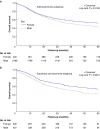Sex-related differences in oncologic outcomes, operative complications and health-related quality of life after curative-intent oesophageal cancer treatment: multicentre retrospective analysis
- PMID: 38568850
- PMCID: PMC10989878
- DOI: 10.1093/bjsopen/zrae026
Sex-related differences in oncologic outcomes, operative complications and health-related quality of life after curative-intent oesophageal cancer treatment: multicentre retrospective analysis
Abstract
Background: Oesophageal cancer, in particular adenocarcinoma, has a strong male predominance. However, the impact of patient sex on operative and oncologic outcomes and recovery of health-related quality of life is poorly documented, and was the focus of this large multicentre cohort study.
Methods: All consecutive patients who underwent oncological oesophagectomy from 2009 to 2015 in the 20 European iNvestigation of SUrveillance after Resection for Esophageal cancer study group centres were assessed. Clinicopathologic variables, therapeutic approach, postoperative complications, survival and health-related quality of life data were compared between male and female patients. Multivariable analyses adjusted for age, sex, tumour histology, treatment protocol and major complications. Specific subgroup analyses comparing adenocarcinoma versus squamous cell cancer for all key outcomes were performed.
Results: Overall, 3974 patients were analysed, 3083 (77.6%) male and 891 (22.4%) female; adenocarcinoma was predominant in both groups, while squamous cell cancer was observed more commonly in female patients (39.8% versus 15.1%, P < 0.001). Multivariable analysis demonstrated improved outcomes in female patients for overall survival (HRmales 1.24, 95% c.i. 1.07 to 1.44) and disease-free survival (HRmales 1.22, 95% c.i. 1.05 to 1.43), which was caused by the adenocarcinoma subgroup, whereas this difference was not confirmed in squamous cell cancer. Male patients presented higher health-related quality of life functional scores but also a higher risk of financial problems, while female patients had lower overall summary scores and more persistent gastrointestinal symptoms.
Conclusion: This study reveals uniquely that female sex is associated with more favourable long-term survival after curative treatment for oesophageal cancer, especially adenocarcinoma, although long-term overall and gastrointestinal health-related quality of life are poorer in women.
© The Author(s) 2024. Published by Oxford University Press on behalf of BJS Foundation Ltd.
Figures
References
-
- van Hagen P, Hulshof MCCM, van Lanschot JJB, Steyerberg EW, van Berge Henegouwen MI, Wijnhoven BP et al. Preoperative chemoradiotherapy for esophageal or junctional cancer. N Engl J Med 2012;366:2074–2084 - PubMed
-
- Low DE, Kuppusamy MK, Alderson D, Cecconello I, Chang AC, Darling G et al. Benchmarking complications associated with esophagectomy. Ann Surg 2019;269:291–298 - PubMed
-
- Hidaka H, Hotokezaka M, Nakashima S, Uchiyama S, Maehara N, Chijiiwa K. Sex difference in survival of patients treated by surgical resection for esophageal cancer. World J Surg 2007;31:1982–1987 - PubMed
-
- Wagner AD, Oertelt-Prigione S, Adjei A, Buclin T, Cristina V, Csajka C et al. Gender medicine and oncology: report and consensus of an ESMO workshop. Ann Oncol 2019;30:1914–1924 - PubMed
-
- Davidson M, Wagner AD, Kouvelakis K, Nanji H, Starling N, Chau I et al. Influence of sex on chemotherapy efficacy and toxicity in oesophagogastric (OG) cancer: a pooled analysis of four randomised trials. Eur J Cancer 2019;121:40–47 - PubMed
Publication types
MeSH terms
Grants and funding
LinkOut - more resources
Full Text Sources
Medical



